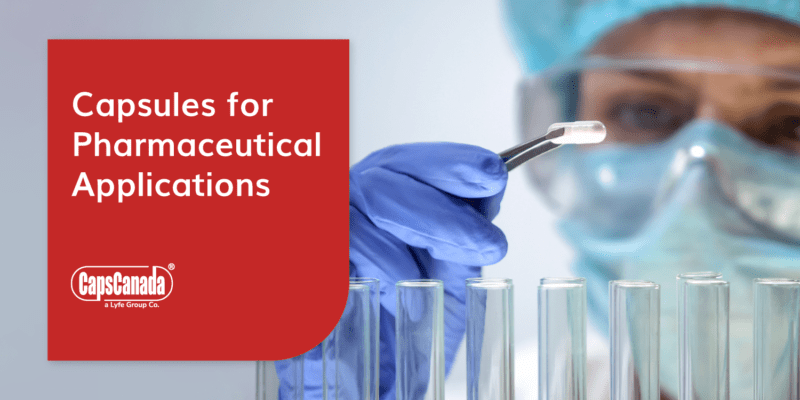What’s Trending in Hard Capsules for Pharmaceutical Applications?
Why are solid oral dosage formats the most popular formats? Because these delivery systems are the most patient-friendly. They are easy to swallow, easy to transport and do not involve potentially frightening or dangerous needles. It’s no surprise that solid oral dosage forms account for over 60% of dosage forms for pharmaceuticals in the market today. And, as we have written about before, within the realm of oral dosage formats, two-piece hard capsules offer some significant advantages over both tablets and softgels (see Tablets and Capsules 5 Things to Consider or Why Liquid Filled Hard Capsules May be a Better Option than Softgels).
Recognizing these advantages, some of today’s biggest trends involve the use of hard-capsule delivery systems to address a variety of pharmaceutical challenges. This includes development and patient-related challenges, regulatory issues and clean-label concerns.
The following provides an overview of these hard-capsule trends.
Speeding time to market
Did you know that your choice of clinical trial capsules can impact the length of your clinical trial? If you choose a standard clear capsule for your clinical trial, changes in the active pharmaceutical ingredient (API), capsule dye color or other factors can lead to delays in your process. To ensure you can leverage studies of clinical stability from earlier stages to support your final dosage, consider using FM-CAPS®.
FM-CAPS® clinical trial capsules are a flexible dosage form that can reduce your time to market by up to nine months by reducing regulatory interaction and the number of required stability studies. Plus, they enable easy color selection using a reformulation approach, giving you a seamless transition from clinical to market capsules.
Addressing bioavailability issues
One of the big trends we’re seeing in pharmaceuticals that are in the development pipeline is formulations with low solubility molecules or other issues that reduce bioavailability.
To address this issue, many of these APIs can be suspended in a lipid solution and then encapsulated in liquid fill capsules such as LQ-CAPS® in order to improve bioavailability. This is often a much better option than the conventional particle-size reduction approach to increasing bioavailability as that approach can cause heat-related degradation in many formulations.
Creating low-dose medicines from highly potent APIs
Another one of the big trends in pharmaceuticals development is formulations that contain highly potent APIs. The difficulty lies in finding a way to turn these super-potent drugs into low-dose medicines. Liquid fill capsules can help in this area, too. With liquid fill capsules, you can achieve a homogenous, accurately dosed formulation. Suspending the highly potent APIs in liquid also eliminates exposure risk for filling machine operators.
Delaying release of the API
Some of the newer chemical compounds are sensitive to gastro-intestinal environments. Simply put, they are likely to be destroyed if they come into contact with stomach acids and/or stomach enzymes. Other compounds can withstand this onslaught, but are so irritating to the stomach lining that the patient would not tolerate them.
To get around these issues, one solution is to use enteric coated capsules that delay the release of the API until after it has passed through the stomach. A high-quality, cost-effective alternative to the expensive and time-consuming enteric coating process is to use CapsCanada’s AR-CAPS®. These gastric-acid-resistant hard capsules are made with a unique plant-based HPMC formulation and the hypromellose phthalate (HPMCP) polymer. AR-CAPS®, which are acid-resistant by design, will pass through the stomach and then dissolve in the duodenum.
Combining APIs
One of the things that makes hard capsules unique in the realm of oral dosage delivery systems is their ability to encapsulate a combination of fill types—including liquids, powders, granules, beads, tablets and smaller capsules—into one capsule. Both G-CAPS® gelatin capsules and K-CAPS® HPMC capsules offer this benefit.
There are two main reasons why formulators are creating drugs with combined APIs:
- To combine otherwise incompatible chemicals into one capsule. For example, you can encapsulate a capsule and a liquid together, or a variety of beads, thereby avoiding problems with chemical interactions between APIs.
- To modify release profiles so as to reduce pill burden. An immediate-release and an extended-release formulation of the same drug or synergistic drugs can be encapsulated together. This combined APIs approach can reduce the number and frequency of pills that the patient needs to take. Single-dose regimens will always achieve greater patient compliance (and patient satisfaction) than multiple-dose regimens.
Eliminating TiO2
On August 7, 2022, a ban on the use of titanium dioxide (TiO2) as a food additive in food and food supplements sold in the European Union will go into full effect. While the ban does not yet apply to pharmaceuticals, eventually it will. Especially for new drugs in the pipeline, the best course of action is to simply go to market with a TiO2-free product, thus eliminating the need for additional regulatory review down the road.
CapsCanada’s vegetarian K-CAPS® made with natural colorants provide the same outstanding performance as K-CAPS® made with synthetic colorants, but in a hard capsule that is completely free of TiO2.
Supporting clean label goals
Although the pharmaceuticals industry has traditionally favored gelatin hard capsules such as G-CAPS®, one of the current trends that’s starting to gain some momentum is a move towards plant-based capsules such as K-CAPS® in order to make products more eco-friendly. While many APIs are synthetic chemical compounds that would not meet “clean label” standards, formulators are looking at other ways that they can move in the clean label direction.
Conclusion
If these trends are affecting your organization and you’d like to learn more about how two-piece hard capsules can help you address your pharmaceuticals challenges, or you would like to request samples of G-CAPS®, K-CAPS®, AR-CAPS®, FM-CAPS®, or TiO2 K-CAPS® made with natural colorants, contact CapsCanada at info@capscanada.com



